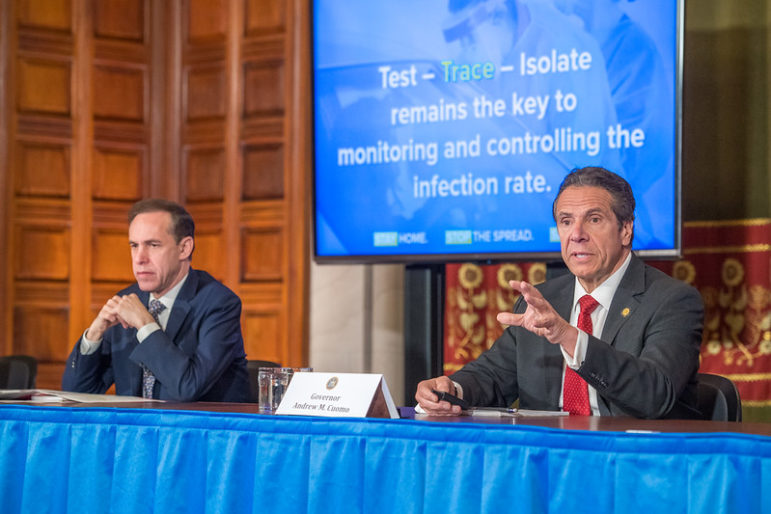‘If New Yorkers are concerned about how their information will be used in contact tracing, they will hesitate to participate. Gov. Cuomo must sign the Contact Tracing Confidentiality Act, which would guarantee that ICE and police do not have access to the collected information.‘

Darren McGee/Office of Governor Andrew M. Cuomo
Gov. Cuomo announcing the start of the state’s contact tracing program in April.Earlier this month, Governor Cuomo announced a new contact tracing app, “COVID Alert NY,” as part of the state’s efforts to curb the spread of COVID-19. Downloads quickly hit 300,000. This should be cause for celebration: As we approach cold weather months and COVID cases are climbing to a third peak nationwide, we need every tool at our disposal to stop the spread.
Contact tracing is essential. But New York’s contact tracing program contains major vulnerabilities, exposing New Yorkers’ sensitive information to the police and ICE. As public defenders who witness daily the devastation wrought by mass incarceration and immigration raids, we see privacy protections against these vulnerabilities as essential to New Yorkers’ safety.
 CityViews are readers’ opinions, not those of City Limits. Add your voice today!
CityViews are readers’ opinions, not those of City Limits. Add your voice today!
Frankly, we are alarmed by Governor Andrew Cuomo’s failure on this front. For more than two months, he has left unsigned the Contact Tracing Confidentiality Act, which would protect the information New Yorkers share with contact tracers from law enforcement. The bill unanimously passed the Senate and the Assembly this summer and awaits a decision by the Governor. Without those protections, we have serious reservations about New York’s contact tracing privacy protections.
The reality is that participation in contact tracing is becoming something of a legal and practical mandate. For example, students are barred from public schools unless they submit to contact tracing. Employers, too, may require it. Of course, there’s a clear public health argument for this mandate. But that argument does not justify leaving the contact tracing data—the whereabouts, associations, and health information—of undocumented families vulnerable to access by ICE, for example.
As public defenders, we know police surveillance of our neighborhoods leads directly to mass incarceration and mass detention. And we have seen district attorneys twist simple associations between childhood friends into the basis for gang prosecution and dragnet conspiracy charges. Given the lack of legal guarantee that information will not be used against the people we serve, we are frankly concerned about our clients’ participation.
Our fears are not without precedent: During the height of the HIV epidemic, health departments nationwide pushed forward robust contact tracing programs. Those programs achieved real gains for disease prevention, but their data was also weaponized against those most affected. More than 30 states passed laws that criminalized HIV transmission, and the data from contact tracing became the backbone of those associational prosecutions. In that space, basic health privacy laws did not matter and empty promises of confidentiality rang hollow. Echoes of this criminalization of health information can be heard today: England has begun to share its contact-tracing data with the police, despite health officials warning against the dangerous decision.
Short of a vaccine, contact tracing is one of the most effective tools we have against COVID-19, and the people we serve stand to benefit more than most New Yorkers from a successful, just contact tracing program. Because of systemic racism, the novel coronavirus has proven twice as deadly to Black and Latinx people in New York City than it has for white people, with infection rates more than twice as high in these communities nationally. And with cases on the rise coming into this fall, heading off a second wave is absolutely critical for the communities we serve.
But if New Yorkers are concerned about how their information will be used in contact tracing, they will hesitate to participate. Current participation numbers reflect that concern. The solution to this problem is obvious: Gov. Cuomo must sign the Contact Tracing Confidentiality Act. The law would guarantee that ICE and police do not have any access to information collected by contact tracing programs in New York—a privacy protection mirroring that of the Census.
New Yorkers should not have to choose between their health and their privacy. We urge Gov. Cuomo to sign the Contact Tracing Confidentiality Act immediately so that all of us can safely participate in the state’s fight against COVID-19 and protect our neighbors from a second wave.
Elizabeth Daniel Vasquez is special forensic science counsel at Brooklyn Defender Services. Alice Fontier is the managing director of Neighborhood Defender Service of Harlem.









2 thoughts on “Opinion: NY’s Contact Tracing Program Must Protect Participants’ Privacy”
I visited a local restaurant a few days ago. They had the NYCDOH contact-tracing sign in sheet out in the open. Anyone signing it can see the name and signature of previous signers. I did not put my real name or phone number down on the sheet.
Name, signature and phone number…………….